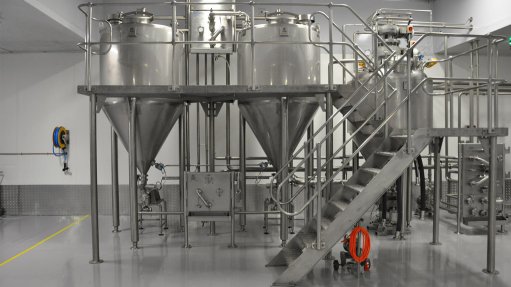
CUSTOM DESIGN Anderson Engineering developed several unique processing steps to ensure AR Brands can meet expected demand for its mayonnaise over a five-year period
Owing to its strong reputation for customisable turnkey solutions, there is steady and strong demand for stainless steel processing equipment manufacturer Anderson Engineering’s products throughout the African markets that it serves, says Anderson Engineering deputy MD David Nienaber.
“Our strength lies in the full service offering that we provide,” he says, noting that the company has a strong presence in South Africa in the food and pharmaceuticals markets, and has also undertaken many projects for the brewery and beverage industry, as well as the personal care, chemicals and dairy markets.
“A large portion of our work comes from referrals and word of mouth and, through many years of doing what we do, we have earned a well-respected name in the local market.”
Located in KwaZulu-Natal, Nienaber highlights that Anderson Engineering is often seen as the “go to” company in the province for stainless steel products and solutions. However, the company’s reach is not limited to this area, with servicing the country, comprising about 65% of its work, and supplying other African countries, including Nigeria, Ethiopia, the Democratic Republic of Congo (DRC), Sudan, Zimbabwe, Kenya and Ghana, the remaining 35%.
Recently completed projects that demonstrate the scope of Anderson Engineering’s turnkey work include a new mayonnaise process line for consumer goods and milling company RCL Foods’ grocery division, in Johannesburg; an upgrade to margarine producer Blue Band’s factory in Kinshasa, in the DRC; a Castle Milk Stout maltose handling project for brewing and beverage company SABMiller in Port Harcourt, Nigeria; a turnkey manufacturing plant for ethnic hair care products and cosmetics producer J Strikland Africa, in KwaZulu-Natal; and the expansion of a blood plasma fractionation plant for pharmaceuticals company National Bioproducts Institute, also in KwaZulu-Natal.
Anderson Engineering was also approached by AR Brands, which was pursuing the development of a new business venture in manufacturing mayonnaise, in 2014.
“The company believed that, as a start-up business, it could compete with major established mayonnaise producers, for a small market share. Its strategy was to position the business near an edible-oil mill, in Pietermaritzburg, to reduce transport costs, while engaging science-based products and services company DuPont to formulate an egg-free mayonnaise.”
Nienaber notes that several meetings were required with DuPont to clarify the process requirements. This was followed by a specification of the equipment required, which would provide sufficient product growth capacity, volumes and capabilities to meet expected demand for AR Brands’ mayonnaise over a five-year period.
“Anderson Engineering came up with several unique processing steps, which were incorporated into the overall process design of the project. “It was made clear that the owner required a high-quality food processing plant to meet the standards of major retailers.”
The company received approval to proceed with the project in August 2014, with the manufacturing of the equipment, as well as delivery and installation, taking about six months to complete. Nienaber highlights that the project was a full turnkey solution that incorporated many of Anderson Engineering’s stainless steel products, including an Anderson 1 000 ℓ contramix vessel, two 2 000 ℓ storage tanks, four premix vessels, a clean-in-place system, a reverse osmosis water plant, a steam boiler and an automation and control system.
Nienaber notes that stainless steel equipment is ideally suited to the food industry not only because of its corrosion resistance, durability and high strength but also because of its hygiene properties. Owing to its smooth surface, it is easy to clean, with its corrosion resistance ensuring that it does not shed or leach any of its constituents into the product. Stainless steel is also resistant to pitting corrosion from chloride salts, eliminating the risk of bacteria being able to thrive in pits and contaminate the product.
“The project was a prime example of our capabilities in producing customisable solutions,” concludes Nienaber.